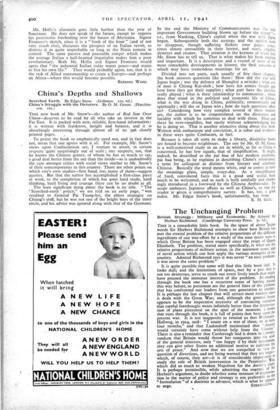China's Depths and Shallows
Scorched Earth. By Edgar Snow. (Gollancz. I2S. 6d.) THIS new book of Mr. Snow's—the author of Red Star Over China—deserves to be read by all who take an interest in the Far East. It is packed with new, reliable, first-hand information: it is written with frankness, insight and balance, and it is absorbingly interesting through almost all of its 396 closely
printed pages. ,
To praise the book so emphatically need not, and in fact does not, mean that one agrees with it all. For example, Mr. Snow's views upon Confucianism are, I venture to assert, in certain respects quite surprisingly out of scale ; one suspects, too, that he knows the Chinese gentry, of whom he has so much to say, a good deal better from the out than the inside—as is undoubtedly the case amongst critics with social views similar to Mr. Snow's of their contemporaries in this country. There are other points on which one's own studies—first hand, too, many of them—suggest queries. But that the author has accomplished a first-class piece of work, to the completion of which has gone hard study, hard thinking, hard living and courage there can be no doubt at all.
The least significant thing about the book is its title. "The 'Scorched-earth' policy," we are told on an early page, "was credited to General Pai Tsung-hsi, the ablest strategist on C.hiang's staff, but he was not one oi the bright boys of the inner circle, and his advice was ignored along with that of the Germans. In the end the Ministry of Communications was the only important Government building blown up before the retreat"— i.e. from Nanking, China's capital when the war with Japan began. Subsequently both the strategy and the epithet seem to disappear, though suffering flickers over pages, some- times almost unreadable in their horror, and sears, cripples, destroys and creates. That creation is the keynote of much that Mr. Snow has to tell us. That is what makes his book exciting and important. It is a description and a record of some of the most remarkable developments in history, the final outcome of which may have tremendous meanings for us.
Divided into ten parts, each usually of five short chapters, the book answers questions like these: How did the war with Japan begin ; was the defence of Shanghai a mistake ; what sort of man is Chiang Kai-shek ; how have his armies fought and how have they got their supplies ; what part have the guerillas really played ; what is their relationship to communism ; where does that stand in the political and economic life of China; what is the war doing to China, politically, economically and spiritually ; will she or Japan win ; how do such questions affect us? Considering how very complex several of these matters are, the author is to be congratulated on the directness and lucidity with which he contrives to deal with them. Here and there he over-simplifies, but rarely without acknowledging that he is doing so. That is another attractive thing about this book. Written with enthusiasm and conviction, it is sober and modest— in these ways quite Confucian, in fact.
Because it takes all sorts to make a library, dissimilar books are bound to become neighbours. The one by Mr. 0. M. Green is a well-conceived study in an art in which, as far as China is concerned, he has few equals, that of simplification. It might, indeed, be described as the pai hua of her modern problems, pai hua being, as he explains in describing China's renaissance, a term for colloquial as distinct from, literary and scholastic Chinese. Basically the word means white, and so comes to have the meanings plain, simple, every-day. As a simplification of , hard, convoluted facts this is a good and useful book much to be welcomed, and as such is both cordially and charm- ingly introduced in p foreword by the Chinese Ambassador. Its scope embraces Japanese affairs as well as China's, so that the reader is given a comprehensive survey. It has, too, a good index. Mr. Edgar Snow's book, unfortunately, has none. - E. M. Guu..






























 Previous page
Previous page